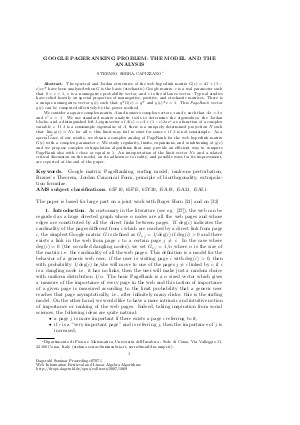Google Pageranking Problem: The Model and the Analysis
Author Stefano Serra Capizzano
-
Part of:
Volume:
Dagstuhl Seminar Proceedings, Volume 7071
Part of: Series: Dagstuhl Seminar Proceedings (DagSemProc) - License:
 Creative Commons Attribution 4.0 International license
Creative Commons Attribution 4.0 International license
- Publication Date: 2007-06-28
File

PDF
DagSemProc.07071.10.pdf
- Filesize: 389 kB
- 34 pages
Document Identifiers
Subject Classification
Keywords
- Google matrix
- rank-one perturbation
- Jordan canonical form
- extrapolation formulae.
Metrics
- Access Statistics
-
Total Accesses (updated on a weekly basis)
0Document
0Metadata
Abstract
Let $A$ be a given $n$-by-$n$ complex matrix with eigenvalues $lambda
,lambda _{2},ldots ,lambda _{n}$. Suppose there are nonzero vectors $%
x,yin mathbb{C}^{n}$ such that $Ax=lambda x$, $y^{ast }A=lambda y^{ast
}$, and $y^{ast }x=1$. Let $vin mathbb{C}^{n}$ be such that $v^{ast }x=1$%
, let $cin mathbb{C}$, and assume that $lambda
eq clambda _{j}$ for
each $j=2,ldots ,n$. Define $A(c):=cA+(1-c)lambda xv^{ast }$. The eigenvalues of $%
A(c)$ are $lambda ,clambda _{2},ldots ,clambda _{n}$. Every
left eigenvector of $A(c)$ corresponding to $lambda $ is a scalar multiple of $%
y-z(c)$, in which the vector $z(c)$ is an explicit rational
function of $c$. If a standard form such as the Jordan canonical
form or the Schur triangular form is known for $A$, we show how to
obtain the corresponding standard form of $A(c)$.
The web hyper-link matrix $G(c)$ used by Google for computing the
PageRank is a special case in which $A$ is real, nonnegative, and
row stochastic (taking into consideration the dangling nodes),
$cin (0,1)$, $x$ is the vector of all ones, and $v$ is a positive
probability vector. The PageRank vector (the normalized dominant
left eigenvector of $G(c)$) is therefore an explicit rational
function of $c$. Extrapolation procedures on the complex field may
give a practical and efficient way to compute the PageRank vector
when $c$ is close to $1$.
A discussion on the model, on its adherence to reality, and on
possible variations is also considered.
Cite As Get BibTex
Stefano Serra Capizzano. Google Pageranking Problem: The Model and the Analysis. In Web Information Retrieval and Linear Algebra Algorithms. Dagstuhl Seminar Proceedings, Volume 7071, pp. 1-34, Schloss Dagstuhl – Leibniz-Zentrum für Informatik (2007)
https://doi.org/10.4230/DagSemProc.07071.10
BibTex
@InProceedings{serracapizzano:DagSemProc.07071.10,
author = {Serra Capizzano, Stefano},
title = {{Google Pageranking Problem: The Model and the Analysis}},
booktitle = {Web Information Retrieval and Linear Algebra Algorithms},
pages = {1--34},
series = {Dagstuhl Seminar Proceedings (DagSemProc)},
ISSN = {1862-4405},
year = {2007},
volume = {7071},
editor = {Andreas Frommer and Michael W. Mahoney and Daniel B. Szyld},
publisher = {Schloss Dagstuhl -- Leibniz-Zentrum f{\"u}r Informatik},
address = {Dagstuhl, Germany},
URL = {https://drops.dagstuhl.de/entities/document/10.4230/DagSemProc.07071.10},
URN = {urn:nbn:de:0030-drops-10693},
doi = {10.4230/DagSemProc.07071.10},
annote = {Keywords: Google matrix, rank-one perturbation, Jordan canonical form, extrapolation formulae.}
}
